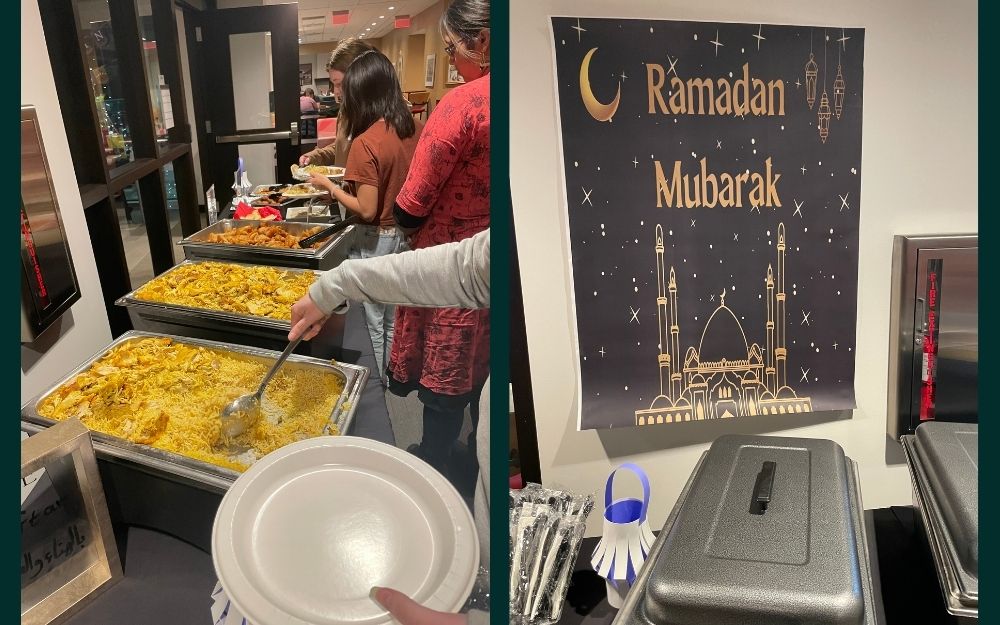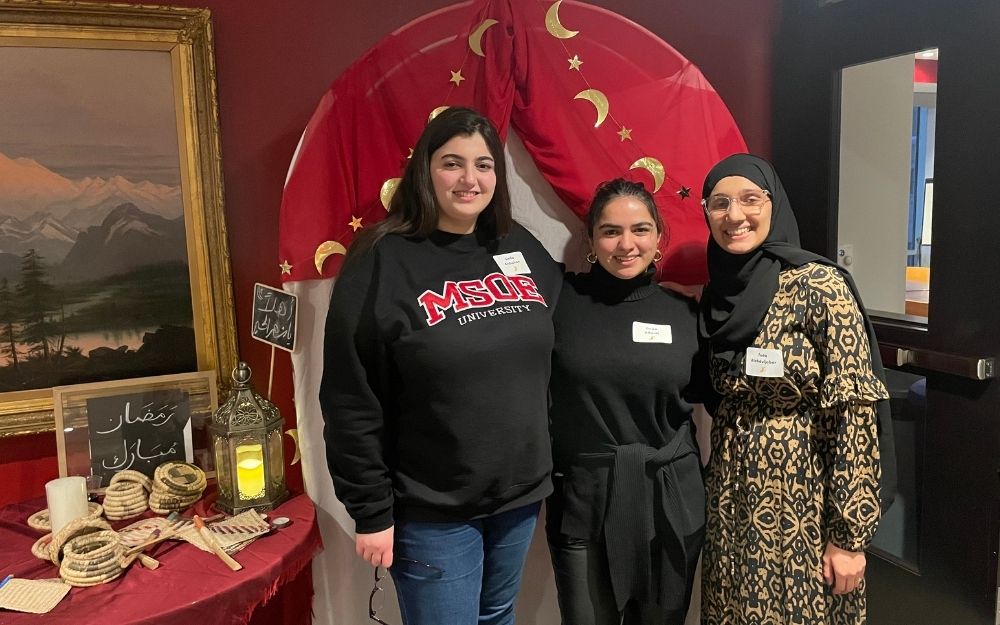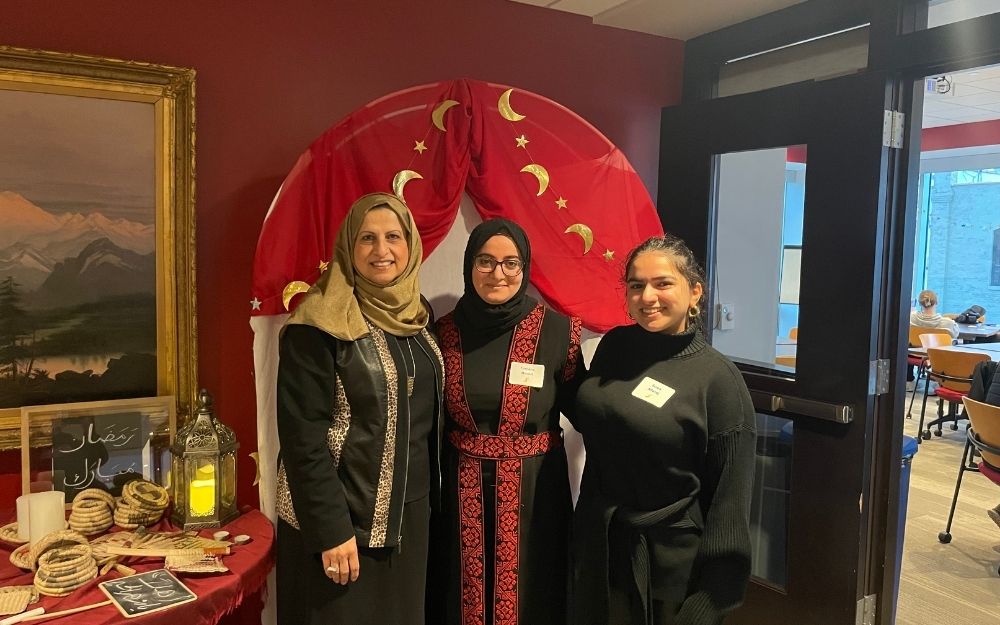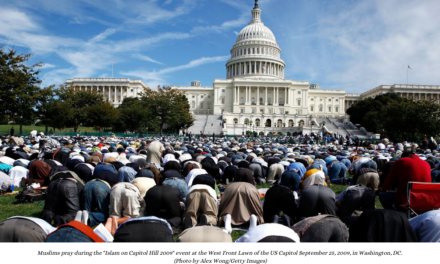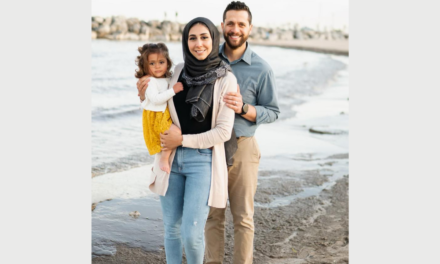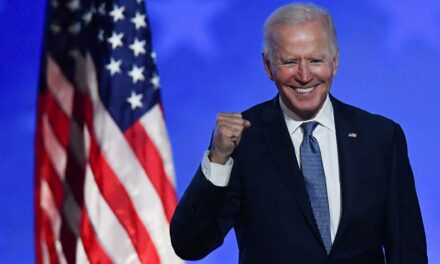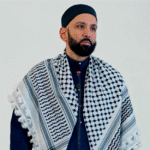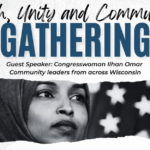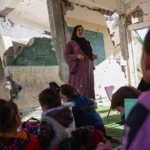Milwaukee School of Engineering Assistant Professor Tamara Omari (center) and student Esraa Alloraj (right) welcomed MMWC President Janan Najeeb to MSOE’s first Ramadan iftar.
In the second of a two-part series, Wisconsin Muslim Journal looks at the increasing opportunities Muslims have to share information about Islam with the larger community. In Friday’s issue, Part 1 looked at recent programs in the media. Today’s story focuses on the grassroots educational outreach taking place on university campuses.
Muslims host Ramadan iftars on campus
At large universities, like the University of Wisconsin-Madison and UW-Milwaukee, gatherings where Muslims come together to break their fasts together during Ramadan have long been held on campus. Likewise, Marquette University Muslims have hosted iftars for years. Muslim students and faculty plan these events and invite the larger university communities to join them for the evening meal, where they explain the month-long fast to their classmates and colleagues. These events create an opportunity to build interfaith understanding.
Milwaukee School of Engineering held Ramadan iftar last week for the first time ever. After MSOE hired Tamara Omari in August of 2021 as an assistant professor in Civil and Architectural Engineering and Construction Management, she started asking Muslim students if they held iftars on campus, said Milwaukee Muslim Women’s Coalition president Janan Najeeb, who was invited to speak at MSOE’s first iftar. “She brought it up to some of her students and they ran with it.”
About 60 students and a few professors, overwhelmingly non-Muslim, gathered just before sunset in a dining area set up with round tables covered in white linen. A nearby room was available for prayer. “In the room, surrounded by glass walls, we had a beautiful view of the sunset,” Najeeb said.
“I was invited to give a 15-minute talk on Ramadan—what it is and how it is practiced. A Saudi student did a beautiful call to prayer, then dates and Saudi coffee were served.” The diners enjoyed a traditional dinner created by the MSOE chef.
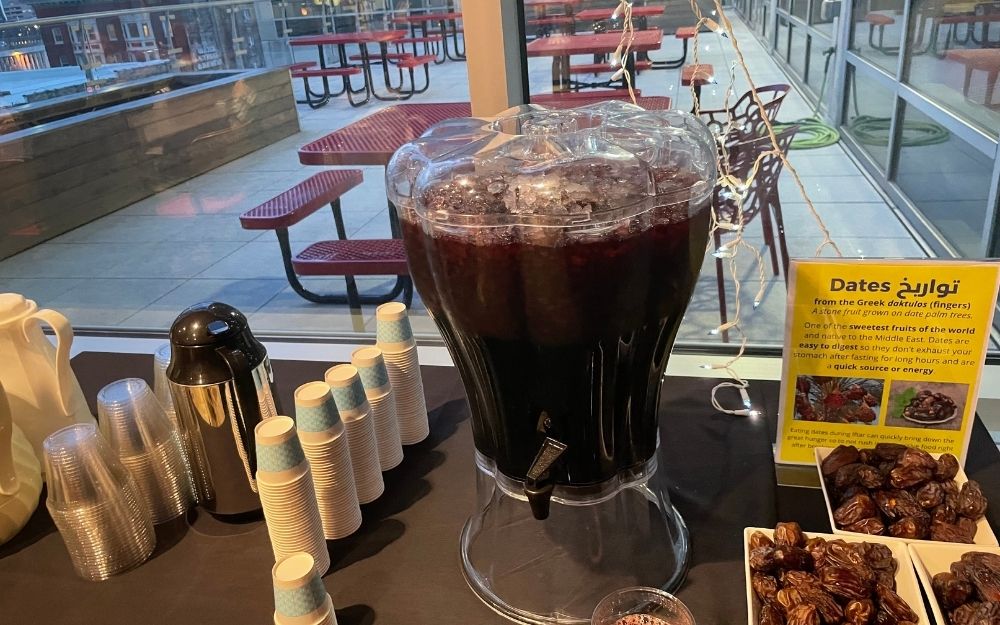
MSOE served dates, traditionally the first food eaten by Muslims to break their fast, and jallab, a sweet drink made from the syrup of grapes, dates and carob.
In her talk, Najeeb talked about how Ramadan helps Muslims build good character—practicing patience and self-restraint, and developing gratitude by realizing we have food, water and everything else by God’s grace, she said. Table discussions followed.
As Muslims prayed salat al-magrib, the “sunset prayer,” one of the five mandatory daily prayers, guests who were not praying were invited to participate in a reflective activity about developing character, Najeeb said.
“The girls at my table told me they had read about Ramadan but it made more sense to them after meeting Muslims and hearing the presentation,” she said. “Many had never heard the call to prayer. They said it was beautiful.”
Najeeb will also speak at an interfaith iftar Wednesday at Marquette University hosted by MU’s chapter of Students for Justice in Palestine for the MU community.
Marquette Muslim Law Student Association invited an Islamic Society of Milwaukee imam, Rami Bleibel, to speak at its iftar last week. The MLSA posted an invitation to all law school students and faculty, inviting them “to celebrate Ramadan, experience a day-in-the-life, learn more about Ramadan and share the experience of breaking fast with the organization.”
Ali Mahmood, co-founder and co-president of Marquette’s MLSA, a 2022 juris doctor candidate, said the invitation also went to undergraduates in Marquette’s Muslim Student Association and Students for Justice in Palestine and to UWM’s MSA and SJP.
About 50 people attended the iftar sponsored by Marquette’s MLSA with support from the Asian Law Student Association, the Student Bar Association and Marquette University. “We had a good turnout. Undergrad students had an opportunity to talk with law school students,” Mahmood added.
“Br. Rami Bleibel spoke generally about what Ramadan is. He touched on how Ramadan is the 9th month of the lunar calendar and how Muslims fast from the essentials (water and food) so we can easily give up temptations outside of Ramadan.”
Mahmood also spoke at the event. “I discussed how very few Muslims go to law school and how law students have a difficult time understanding the Muslim experience.
“I also talked about how it’s hard to get questions answered about law school unless you have a connection, and I encouraged our Muslim students to interact with our non-Muslim law students so both can get a good understanding of each other.
Invitations to classrooms create personal encounters
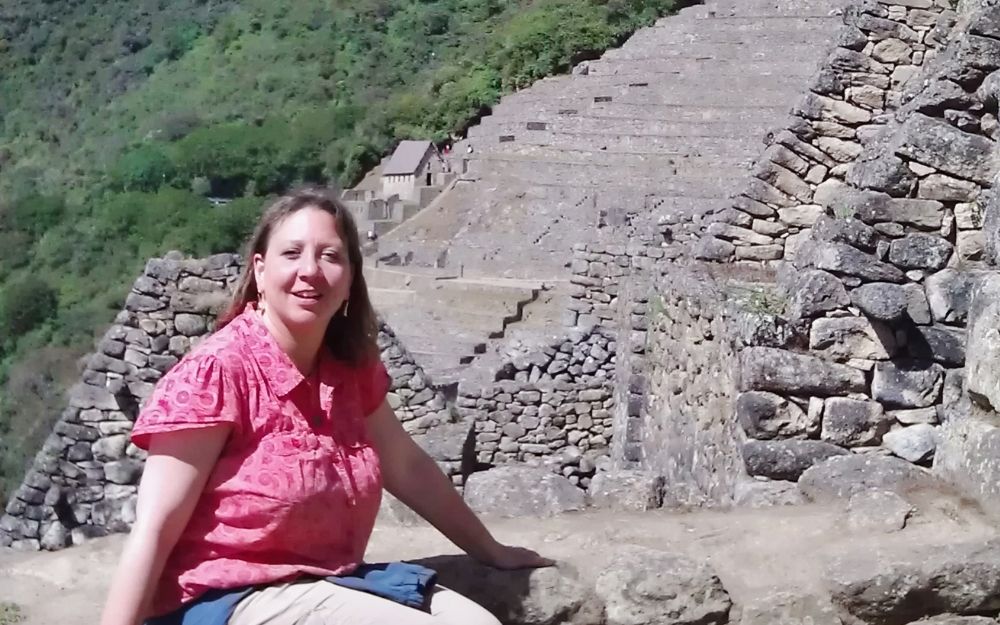
Mount Mary University Director of International Studies Nan Metzger invited members of the MMWC Speakers Bureau to discuss a book based in Egypt with students in her World Literature class.
“When I started teaching World Literature in 2021, I decided to tap into people who could be cultural experts to speak with our class,” said Mount Mary University Director of International Studies Nan Metzger, who has advanced degrees in literature and psychology.
“I had encountered speakers from the MMWC multiple times – once at the UW-Madison Teachers’ Institute and another time at my church, Unitarian Church North, when we had a multi-cultural film series and saw the movie Arranged about a friendship between two young women, an Orthodox Jew and a Muslim.
MMWC’s Speakers Bureau provides speakers as a service to the Greater Milwaukee Community and beyond. They provide speakers on topics related to Islam and health-related issues, since a significant portion of the Muslim community includes physicians, pharmacists and others working in healthcare, Najeeb said.
When Metzger heard Najeeb speak about Arranged, she saw that the Western picture of arranged marriage is misleading, she said. “It paints a negative view, as if women don’t have any agency. When Janan spoke about it, it made more sense, that the two families meet and create support for the couple. And either the young man or woman can decline. I realized those young people have choices and I could see parallels to my family’s experience.”
So, as Metzger prepared her class in 2021, she went to MMWC’s website and put in a request for a speaker to join her class discussion of the book I am Malala. Ream Bahhur and Isabelle Sahraoui, both members of MMWC’s Speaker’s Bureau, joined the class on Zoom (during the pandemic).
When she reached out to them again this year, they suggested she change the book. “They noticed the co-author of I am Mahala is British, so the book was filtered through a Western point of view.”
Sahraoui recommended The Butterfly Mosque, a memoir of G. Willow Wilson, an American woman raised in a secular family who converts to Islam after encountering it in a university course. The story develops as she moves to Egypt to teach, falls in love and creates a life bridging the two cultures. “I found it gave a more nuanced view about Islam and women, and about the Middle East. As the memoir of a 20-something, students would relate to it,” Metzger said.
A convert to Islam and someone who grew up in an expat family with many years in the Middle East, Sahraoui was able to bring a range of perspectives to the discussion that included religion and culture, Metzger said. In addition, Sahraoui met her future husband, a Tunisian, in graduate school. After they married, the couple lived in Tunisia for 13 years.
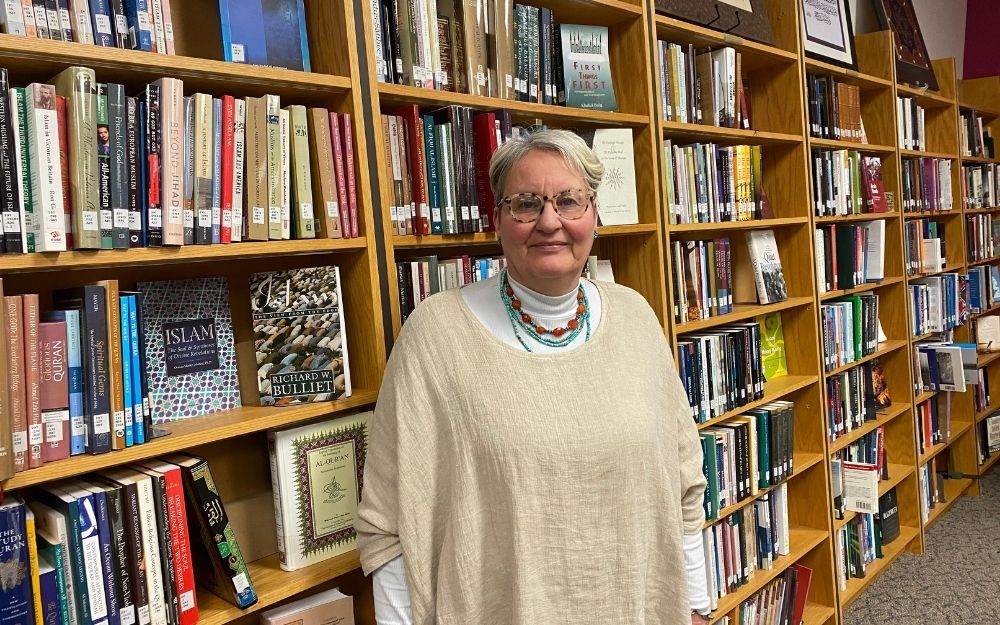
Isabelle Sahraoui speaks with university classes about Islam and the cultures of the Middle East and North Africa.
Metzger had her 16 students prepare questions for Sahraoui.
“Students asked me about my personal experiences as a convert and about my experience in Tunisia,” Sahraoui said. “I was there for 13 years and still have a house there. I was raised an expat, born in Palestine, in Jaffa, in 1961, and landed in Iran in 1971. We left in 1977.
“I tried to address stereotypes. What is perceived is that Muslim society is a very repressive society. And people assume all Muslim countries are alike,” she said. “They are not.
“The book we discussed is set in Egypt. In Egypt, apparently women get cat called. They don’t in Tunisia. The Tunisian society is not segregated by gender; boys and girls go to school together. They are used to being around each other.”
Sahraoui noted that the dictators who had favor in the West were repressive. “That is why people rebelled against them. A lot of women wanted to wear hijab. It was not permitted in public spaces.”
In former French colonies like Tunisia, there is an idea that one can’t be modern and be religious, Sahraoui said. “That is the French perspective of things.
“Tunisia was a very secular society in the 1990s,” she recalled. “My husband’s family was typical middle class; my in-laws were not religious.”
Women in Tunisia are well educated, she added. “Most of the population is literate. Family planning is used. When I was there, families had around two or three children. Now the younger families have two children.
“Women are working in every field. They are everywhere. The medical field is very feminine. There are more women who are judges in Tunisia than in the United States. Women are driving buses and the metro.”
Sahraoui said she wanted to show students that the situations of other countries are more complicated than they seem in U.S. media. “There are always underlying issues.”
The students were curious about Sahraoui’s decision to convert to Islam, she said. “My mother was very Catholic. I was raised Catholic and had first communion.
“I converted as an adult. I always had a hard time digesting the idea of original sin, the notion that you pass on sin from one generation to another. You are a free agent in Islam. You act how you are going to act and you are responsible.
“One student was interested in art history. Some had questions about mosques and different aspects of Islam. They were well prepared and it was a nice discussion.”
Metzger said students’s appreciated Sahraoui’s explanation about why men and women pray separately. “It is for modesty (because they prostrate themselves with their foreheads to the ground). Some students wondered and thought it might be a negative towards women. One student said later she liked the fact that it was not to exclude women but to respect them during prayer.
Students also appreciated hearing about Islam from a person practicing the faith. “A student commented, ‘It was more personable hearing from someone about their experience than reading it in a book,” Metzger reported.
“They were able to learn about some variations in cultures and diverse practices,” she added. “We often learn history through the lens of U.S. military involvement,” which gives a skewed understanding of the Middle East. Sahraoui’s visit “gave a much different view of the role of women in Islam than the headlines out of Afghanistan where they are closing girls’ schools.”
Sahraoui had also served on a panel at Alverno College in Milwaukee last year at the invitation of Nat Godley, Ph.D., assistant professor of history, whose expertise is in the Middle East and North Africa. Visiting classes allows Muslims to dispel misconceptions and answer students’ questions, she noted.
